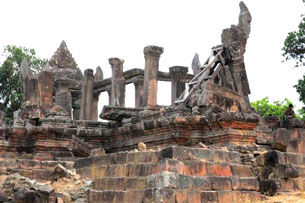Thailand/Cambodia: Pullout ordered in temple row
| Publisher | Radio Free Asia |
| Publication Date | 18 July 2011 |
| Cite as | Radio Free Asia, Thailand/Cambodia: Pullout ordered in temple row, 18 July 2011, available at: https://www.refworld.org/docid/4e3904d9c.html [accessed 30 May 2023] |
| Disclaimer | This is not a UNHCR publication. UNHCR is not responsible for, nor does it necessarily endorse, its content. Any views expressed are solely those of the author or publisher and do not necessarily reflect those of UNHCR, the United Nations or its Member States. |
2011-07-18
The UN's highest court says Thai and Cambodian forces must leave a disputed border territory.
 Preah Vihear temple, in Cambodia's northwestern Preah Vihear province, Feb. 8, 2011. AFP
Preah Vihear temple, in Cambodia's northwestern Preah Vihear province, Feb. 8, 2011. AFP
Thailand and Cambodia have agreed to withdraw their military forces from the area surrounding a disputed temple on their shared border following a verdict by a UN tribunal on Monday in The Hague.
By a vote of 11-5, the judges of the International Court of Justice (ICJ) proposed a new "provisional demilitarized zone" requiring Thai troops to fall back from emplacements around the Preah Vihear temple and Cambodian forces to evacuate the temple grounds.
Under the ruling, Cambodia will continue to administer the 1,000-year-old temple, which was designated a World Heritage Site in July 2008, prompting military clashes six times along the border that left at least 20 dead and tens of thousands displaced until a U.N.-brokered ceasefire was reached in February.
The ICJ also ruled that officers from the Association of Southeast Asian Nations (ASEAN) be stationed in the area to observe the ceasefire.
The court said in a press release that it had acted "in order to ensure that no irreparable damage was caused" to the temple site.
In 1962, the ICJ found Preah Vihear to be part of Cambodian territory, but Phnom Penh recently asked the court for clarifications on the ruling because boundaries of the site were not clearly delineated. Bangkok has said that no further intervention is necessary from the U.N.
Satisfied parties
Both countries' foreign ministers expressed satisfaction with Monday's decision, saying the court had honored their demands.
Outside the courtroom, Thai Foreign Minister Kasit Piromya applauded the ICJ decision to reject a unilateral withdrawal of Thai forces proposed by Cambodia, adding that the removal of Cambodia's military from the temple complex "has been our consistent position."
He told the Associated Press that Thailand would abide by the ruling and had also agreed to allow Cambodian civilian personnel access to supplies at Preah Vihear.
"[ASEAN] urgently needs to send its observers to the area and work to stop the confrontation between our two countries," he later said by telephone.
Cambodian Foreign Minister Hor Namhong said the proposed demilitarized zone would result in "a permanent ceasefire," comparing the withdrawal to "a cessation of aggression" by Thailand.
He commended the court for its decision to include the posting of ASEAN observers in its ruling, which he said Cambodia had been calling for since February.
Mixed reactions
But some in Cambodia's think tank community were displeased with the ruling, including executive director of the Peace and Cooperation Institute Chheang Vannarith.
"[The decision] is unjust for Cambodia, as the court has ordered us to withdraw our troops from an additional area of 4.6 square kilometers (2.8 square miles) as well," he said.
"In terms of peace, however, it is good for the people of the two nations."
The ruling is also likely to strike a nerve in Thailand where, ahead of elections earlier this month, nationalist groups protested in the streets of Bangkok, demanding that the government take control of the disputed area.
While Thailand officially recognizes the ICJ's 1962 ruling on the temple's ownership, many in Thailand say the decision was unfair.
The Thai military has also been accused of fueling the conflict in an apparent bid to gain the public's support.
In April, military leaders rebuffed the deployment of international monitors on either side of the border under the February ceasefire agreement.
The United Nations Educational, Scientific and Cultural Organization (UNESCO) awarded the Preah Vihear complex U.N. World Heritage status in July 2008.
UNESCO said it listed the 11th century Hindu temple due to its exceptional architecture and carved stone ornamentation.
Reported by RFA's Khmer service. Translated by Sum Sok Ry. Written in English by Joshua Lipes.
Link to original story on RFE/RL website
